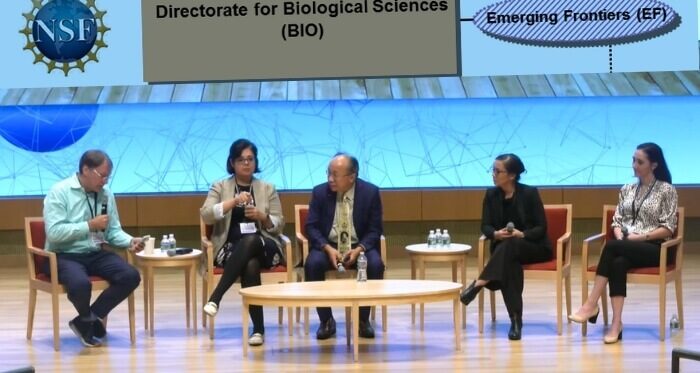Attending conferences can be an enriching experience, offering attendees the opportunity to network, learn about cutting-edge research, and engage with professionals in the field.
If you’re in the realm of biological sciences and pondering the question, “How much does it cost to attend a biological science conference?” you’re in the right place.
Costs can differ significantly based on various factors, including the conference’s location and reputation. Regional events might set you back anywhere from $50 to $500, while prestigious international gatherings can cost between $300 and $1,500.
It’s essential to remember these figures generally cover registration alone, leaving out expenses like travel, accommodation, and meals. Savvy attendees, however, can benefit from early bird rates, which offer substantial savings.
What is the Biological Science Conference?
Biological sciences dive deeply into the intricate tapestry of life, from microscopic cells to vast ecosystems. Conferences in this realm are pivotal events for experts, researchers, and students alike. They provide a nexus for the latest discoveries, discussions, and advancements.

A Biological Science Conference is a professional gathering that brings together researchers, educators, and enthusiasts from the vast field of biology. These conferences offer participants the chance to present research findings, learn about recent advancements, and network with peers. Involving oneself in applied science and engineering conferences is an excellent way to learn about biological science.
Whether regional or international, these events serve as critical platforms for sharing knowledge, fostering collaborations, and setting future research directions. They not only spotlight the latest in biological research but also bridge the gap between various scientific disciplines, enhancing the scope and impact of their findings.
Types of Biological Science Conferences
Biological science encompasses a vast realm of study, reflecting the rich diversity of life and its many intricacies. As such, conferences within this discipline are diverse, catering to specific niches and interests. Each type offers unique insights and knowledge-sharing opportunities.
Cellular and Molecular Biology Conferences
These gatherings focus on the minuscule details of life, from individual cells to intricate molecular interactions. Researchers present findings on cell behavior, genetics, and biochemistry. Such events often intersect with medical and pharmaceutical studies.
Ecology and Evolutionary Biology Conferences
Dedicated to understanding the larger tapestry of life, these events delve into species interactions and evolutionary paths. Discussions might involve ecosystem dynamics, species adaptation, and conservation efforts. Biodiversity and environmental impact are frequent topics.
Neurobiology and Cognitive Science Conferences
The brain’s mysteries and cognitive processes take center stage here. Neuroscientists, psychologists, and experts converge to explore neural networks, cognition, and behavioral patterns. The goal often involves understanding human and animal minds.
Marine and Aquatic Biology Conferences
Oceans, rivers, and lakes brim with life, and these events dive deep into aquatic ecosystems. Marine biologists, ecologists, and conservationists discuss marine life, coral reefs, and aquatic habitats. The protection of these ecosystems is a recurrent theme.
As the vast expanse of biological sciences continues to grow, so too does the array of conferences dedicated to each specialty. Whether one’s interest lies in the tiniest cell or the vast oceans, there’s a conference waiting to spark curiosity and foster connections.
Key Purposes of the Biological Science Conference
Biological Science Conferences serve multiple vital functions in the scientific community. Here are some of the key purposes these conferences fulfill:
Knowledge Dissemination
One of the primary goals of any international scientific conference is to share recent findings and advancements. Presenting research at these conferences allows scientists to communicate their discoveries, methodologies, and conclusions to a broader audience.
Networking and Collaboration
These gatherings offer an invaluable opportunity for attendees to meet, collaborate, and form partnerships. Researchers, educators, and industry professionals can connect, paving the way for future joint ventures or research projects.
Skill Development and Training
Many conferences incorporate workshops, seminars, and training sessions. These activities enable participants to acquire new skills, understand novel technologies, and stay updated with the latest techniques in their respective fields.
Feedback and Peer Review
Presenting research in a conference setting allows for immediate feedback. This interaction can be invaluable for researchers, providing them with constructive criticism, new perspectives, and validation of their work.
Recognition and Career Advancement
For budding scientists and researchers, conferences can be a platform to gain recognition. Exceptional work can be noticed by senior experts, leading to job opportunities, research funding, or collaboration offers.
Setting Future Research Directions
By discussing the latest trends, challenges, and gaps in current knowledge, conferences can help steer the direction of future research. They highlight areas that require further exploration or that are ripe for breakthroughs.
In essence, Biological Science Conferences are more than just events; they are catalysts that foster growth, innovation, and collaboration within the scientific community. They ensure the continuous evolution of knowledge and facilitate the advancement of the field.
How Much Does it Cost to Attend a Biological Science Conference?
Attending a Biological Science Conference comes with its financial considerations. The costs associated can vary based on several factors, such as the location of the conference, its reputation, and duration. Here’s a breakdown:
Registration Fees
- Regional Conferences These tend to be smaller in scale and might be more specialized. Registration fees for such events can range from $50 to $500.
- Major International Conferences Larger conferences with a more global audience, especially those hosted by well-known scientific organizations, can be pricier. Registration for these can fall between $300 and $1,500.
Travel Expenses
Depending on the conference’s location relative to your residence, you might incur significant travel costs. This includes airfare, train tickets, or fuel expenses for those driving.
Accommodation
Staying at or near the conference venue will have its costs. Rates can vary based on the city, proximity to the conference center, and the type of accommodation (luxury hotel, budget hotel, hostels, etc.).
Meals
While some conferences might offer meals as part of the registration package, many do not. Thus, attendees should budget for breakfast, lunch, dinner, and any additional snacks or beverages.
Miscellaneous Expenses
These can include materials or equipment needed for the conference (e.g., posters, presentation tech), local transportation (e.g., taxis, public transport), and networking events or dinners that may have separate fees.
Early Bird Rates
It’s worth noting that many conferences offer discounted registration fees for those who sign up well in advance of the event date. Such early bird rates can offer significant savings.
While the registration fee gives a starting point, the total cost of attending a Biological Science Conference will also depend on travel, accommodation, meals, and other related expenses. It’s advisable to plan, seek early registration discounts, and budget for all potential costs to ensure a smooth conference experience.
Is the Biological Science Conference Worth Attending?
The decision to attend a Biological Science Conference often boils down to an individual’s goals, career stage, and interests. However, there are several compelling reasons why many consider these conferences worth attending
Knowledge Enhancement
Conferences are hubs for the latest research findings, methodologies, and technological advancements in biological sciences. Attending allows participants to stay updated and informed about the newest developments in their field.
Networking Opportunities
These events provide a unique platform to meet peers, senior researchers, industry professionals, and potential collaborators. Networking can open doors to research collaborations, job opportunities, and academic partnerships.
Skill Building
Many conferences host workshops and hands-on training sessions. These can be invaluable for learning new techniques, software applications, or laboratory methods directly from experts.
Feedback and Validation
Presenting research at a conference can lead to constructive feedback from peers and experts. This feedback can help refine research methodologies, address overlooked aspects, or even pave the way for publication in reputed journals.
Exposure and Recognition
For early-career researchers and students, conferences offer a platform to showcase their work, get noticed, and build a reputation in the scientific community.
Perspective Diversification
Listening to diverse presentations and engaging in discussions can provide fresh perspectives, inspire new research ideas, and challenge one’s existing beliefs or methodologies.
Collaborative Initiatives
Conferences often serve as the starting point for collaborative research projects, joint publications, or academic exchanges.
Rejuvenation
Stepping out of the regular work environment and immersing oneself in a space dedicated to learning and growth can be invigorating. It can reignite passion and enthusiasm for one’s work.
However, there are considerations
- Cost- As previously discussed, attending a conference can be expensive. One has to weigh the benefits against the financial and time investments required.
- Relevance- Not every conference will be pertinent to an individual’s specific research or interests. It’s crucial to choose events that align with one’s goals.
In summary, while Biological Science Conferences offer a myriad of benefits, it’s essential to consider individual goals and the potential return on investment. For many, the benefits of knowledge acquisition, networking, and exposure far outweigh the costs, making these conferences a valuable aspect of their professional journey.
Last Brief
Biological Science Conferences stand out as invaluable platforms for growth, knowledge exchange, and collaboration. While the costs associated, ranging from registration fees to travel and accommodation, might raise the question, “How much does it cost to attend a biological science conference?”
The potential returns on personal and professional fronts often justify the investment. Beyond monetary expenses, these gatherings offer a wealth of insights, networking opportunities, and career advancements.
By carefully selecting relevant events and optimizing expenses, attendees can reap the manifold benefits these conferences present, ensuring they remain at the forefront of biological discoveries and advancements.







